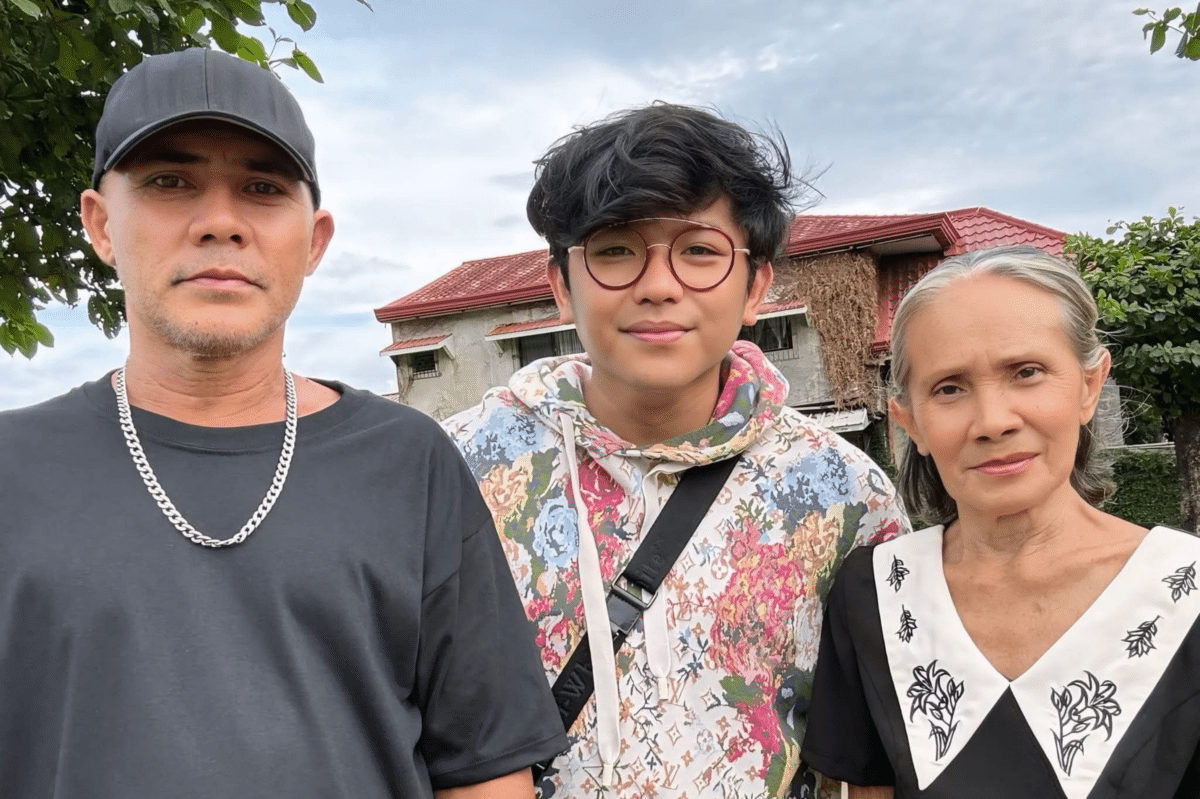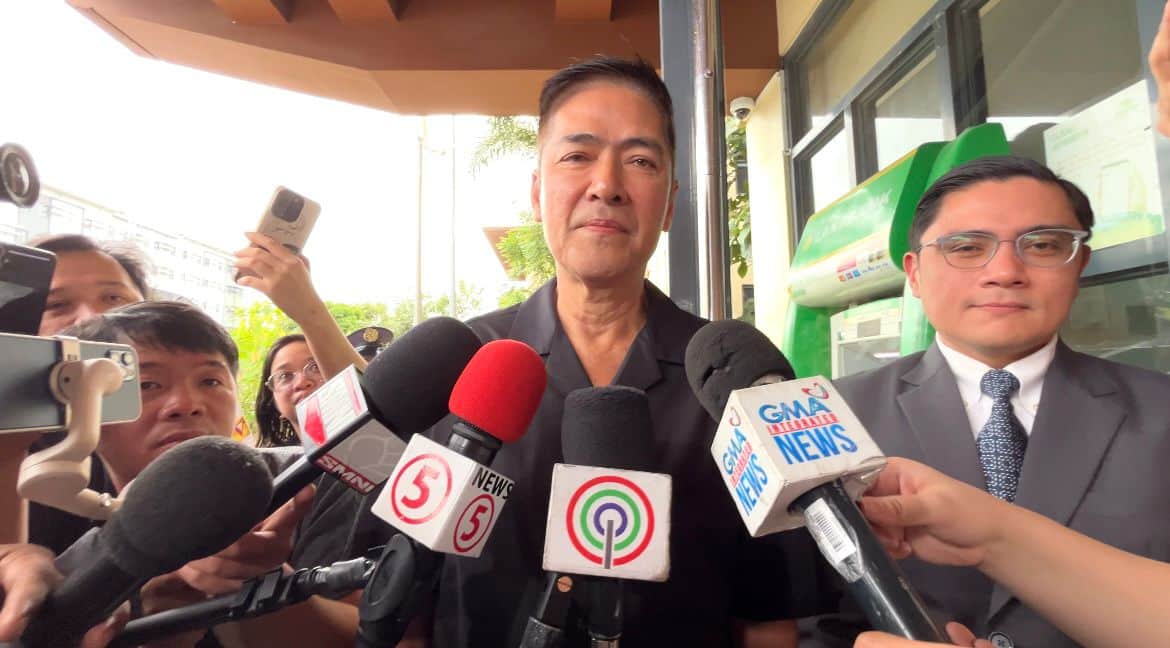(From left) Vic Sotto and Darryl Yap. Image: FILE PHOTOS
Forty years after the death of ’80s sexy star Pepsi Paloma, the story of her life is being made into a new movie by director-screenwriter Darryl Yap, but controversy already preceded the biopic even before it could be shown in local theaters this February.
What fanned the fire that set in motion the legal tussle involving the movie, initially titled “The Rapists of Pepsi Paloma,” (TROPP) which alone already raised some eyebrows, was the movie teaser that brazenly dropped the name of Vic Sotto as an alleged rapist, to which the actress playing the titular role seemingly confirmed.
Born Delia Dueñas Smith, Paloma was classified as one of the “softdrink beauties” with Coca Nicolas and Sarsi Emmanuelle. She appeared in movies such as “Brown Emmanuelle,” “The Victim,” “Virgin People,” and “Matukso kaya ang Anghel,” to name a few, before her death in May 1985.
FEATURED STORIES
ENTERTAINMENT
ENTERTAINMENT
ENTERTAINMENT
As the habeas data case is set for summary hearing on January 15, here’s a recap of how the controversy shaped up.
Tribute to Paloma
At the outset, Yap claimed he had no ill motive against Sotto in making this movie. He said that the film is his tribute to Paloma, his kababayan, or town mate in Olongapo City, Pampanga, whose 40th death anniversary will fall in May 2025.
Article continues after this advertisement
“Direk Yap made this movie because 2025 is the 40th anniversary of the death of Pepsi Paloma, his kababayan in Olongapo,” Atty. Raymond Fortun, legal counsel of Yap, told INQUIRER.net.
Article continues after this advertisement
Still, Sotto’s camp does not see it that way. On June 7, he filed a petition for habeas data before the Muntinlupa regional trial court. Two days later, he filed 19 counts of cyberlibel complaints before the city prosecutors, with a claim for damages amounting to P35 million. The actor-host, too, claimed he has no personal grudge with anyway, but said he is against those who are “irresponsible,” especially on social media.
The respondent’s camp also took pains to explain that the young filmmaker is “not irresponsible,” and very much aware of his constitutional rights in coming out with this movie. “There is nothing libelous about the teaser or any of the materials he has posted on social media,” said Fortun.
Teaser
The movie’s trailer, which was released on January 2, sparked controversy after the explicit mention of Sotto’s name during a heated confrontation scene between Rhed Bustamante (who portrayed Paloma) and Gina Alajar (starring as Charito Solis).
Fortun reiterated there was “nothing wrong” with this content, claiming the purpose of teasers was to attract the interest of potential moviegoers.
“There is no libel. The content of that teaser is based on historical fact that is backed up by dozens of news articles. It is not a work of fiction that is meant to defame anyone,” Fortun said of the trailer.

Darryl Yap (center) with the brother (left) and mother (right) of the late sexy star Pepsi Paloma. Image: Facebook/Darryl Yap
In another attempt to explain his side of the story, Yap said in a Facebook post dated January 7 that the movie will include accounts from Paloma’s mother Lydia and brother Zaldy. However, the post has since been taken down from his page.
References to Vic Sotto, threats to family
Sotto’s legal counsel Enrique Dela Cruz, alleged the Yap’s posts and movie trailer all alluded to the screen veteran as having to do with the “Pepsi Paloma” movie, tending to besmirch his character and threatened his and his family’s security.
He cited as example Yap’s reference to “Laban o Bawi,” a popular segment of the noontime show “Eat Bulaga” where Sotto is host.
In his complaint, Sotto attached screenshots of social media posts insinuating that his wife Pauleen Luna-Sotto was also raped, as well as rape threats on his wife and their daughter. He also stressed that the movie’s title was a “sensational” attempt to “generate public interest in his movie by clearly insinuating that Paloma was raped.”
“I felt unsafe and afraid since I read comments from strangers threatening to rape my wife and my minor child. I also felt that my right to privacy was being violated because this rape accusation is NOT TRUE and the dissemination of this wrong information is fooling a lot of people,” read Sotto’s petition.

Vic Sotto shares his reaction after filing cyber libel case vs Darryl Yap for the ‘Pepsi Paloma trailer’ on Thursday, Jan. 9, at the Muntinlupa RTC. Image: INQUIRER.net/ Jessica Ann Evangelista
The “Eat Bulaga” host’s petition also reiterated that the explicit mention of his name in the trailer is a move that includes “sensitive personal information,” which violates the Data Privacy Act.
“In one of his Facebook posts, he even posted a snippet of an old newspaper article regarding the filing of the case against me. Also, at the end of the teaser video, there is likewise a statement regarding the filing of the rape case against me by Pepsi Paloma on 17 August 1982. What is worse is that he maliciously and purposefully left out the fact that the said case was already dismissed because it is not true,” he said.
“Notably, respondent Darryl did not previously obtain petitioner’s permission on whether his name may be used for the film TROPP, much more in this case when there is a clear attempt to disparage the image and reputation of the personality cited – that of petitioner… Respondent Darryl DID NOT seek his side of the story or any of his friends or family’s side for their comments on the truth or falsity of the supposed rape allegation,” his petition further stated.
Habeas data
In his habeas data petition, Sotto asked the court to issue a writ that would stop the use of any or all sensitive information about him in the movie or its trailer.
A writ of habeas data is a legal remedy that is designed to protect the image, privacy, honor, information, and freedom of information of an individual, especially if that information is being collected by certain individuals through unlawful means in order to achieve unlawful ends.
For a habeas data case to prosper, the following elements must be present, according to Supreme Court Justice Marvic Leonen: “First, that a person has right to informational privacy; second, that there is a violation or a threat to violate such right which affects a person’s right to life, liberty and security; third, that the act is done through unlawful means in order to achieve unlawful ends; fourth, that the act is committed by a public official or employee, or of a private individual or entity engaged in the gathering, collecting or storing of data or information; fifth, that the information gathered, collected or stored pertained to the person, family, home and correspondence of the aggrieved party; and sixth, that the petition was lodged before the proper court.”
Sotto’s camp claimed all these elements were present in his case.
Furthermore, Sotto claimed Yap did not seek his side of the story, or any of his friends or family’s side for comments on the “truth or falsity of the supposed rape allegations.” But given the online traction gained through Yap’s publicity stunts, the personal attacks continued.
“More importantly, in light of the Data Privacy Act of 2012, petitioner retains the right to demand the removal of his personal information and sensitive personal information from respondent Darryl’s Facebook posts, promotional materials and teaser videos posted on all platforms, considering that these were used to perpetrate false and incorrect information. The case lodged in 1982 by Pepsi Paloma against petitioner for the same offense before the Office of the City Prosecutor of Quezon City was already dismissed. Several news articles have confirmed the dismissal,” he said.
In this regard, Sotto asked the court to enjoin respondents from disseminating in all platforms all promo materials depicting personal information about him; to remove and take down these materials from all platforms, and to produce and provide all sensitive personal information that the respondents collected about him; and to suppress the processing and sharing of these materials within their control and/or contained in their
database.
This post was originally published on here







